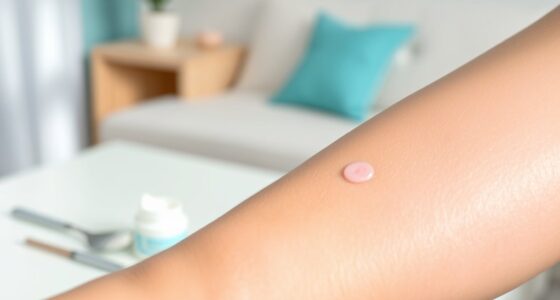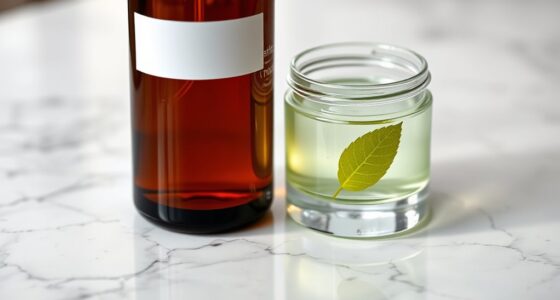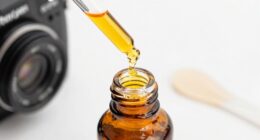To nurture your skin’s ecosystem, choose microbiome-friendly skincare that supports your natural balance. Look for gentle, pH-balanced products with probiotic or prebiotic ingredients. Avoid harsh cleansers and over-exfoliating, which can strip beneficial microbes. Instead, focus on nourishing and maintaining your skin’s pH to keep your microbiome thriving. If you want to discover more ways to boost your skin’s resilience and overall health, keep exploring the options that promote a healthy microbial environment.
Key Takeaways
- Use gentle, pH-balanced cleansers to maintain the skin’s natural acidity and microbial balance.
- Incorporate probiotic or prebiotic ingredients to support beneficial skin bacteria.
- Avoid harsh, antimicrobial, or over-exfoliating products that disrupt the skin’s microbiome.
- Support skin barrier health to create a resilient environment for beneficial microbes.
- Adopt consistent, mindful skincare practices to promote a healthy, thriving skin ecosystem.

Have you ever considered how your skincare routine might impact the tiny organisms living on your skin? These microorganisms, part of your skin’s microbiome, play a essential role in maintaining your skin’s health and defense. When you choose products, it’s important to think beyond just battling wrinkles or acne—your choices can either support or disrupt this delicate ecosystem. One effective way to nurture your skin’s microbiome is by using products with probiotic ingredients. These ingredients introduce beneficial bacteria that help restore balance, especially if your skin has become stressed by harsh cleansers or environmental pollutants. Instead of killing all bacteria with strong antibacterials, probiotic skincare encourages good bacteria to thrive, which can lead to a healthier, more resilient skin barrier.
Supporting your skin’s microbiome with probiotic skincare promotes a healthier, more resilient barrier and overall skin health.
Alongside probiotic ingredients, pH balancing is equally critical for microbiome-friendly skincare. Your skin’s natural pH hovers around 4.5 to 5.5, creating an environment that supports beneficial microbes while discouraging harmful bacteria. Many conventional cleansers are too alkaline, which can disrupt this balance and leave your skin vulnerable to irritation, breakouts, or dryness. By choosing pH-balanced products, you help maintain your skin’s natural acidity, preserving the ecosystem that keeps your skin protected and balanced. When your skincare products are aligned with your skin’s pH, it becomes easier for your microbiome to perform its functions—like barrier repair and immune support—more effectively. Additionally, using antimicrobial agents excessively can harm the beneficial microbes and disturb this balance.
Moreover, a microbiome-friendly routine encourages gentle cleansing and hydration, avoiding over-exfoliation or harsh ingredients that strip away natural oils and beneficial microbes. Instead, look for mild, nourishing formulas that respect your skin’s natural pH and include probiotic or prebiotic ingredients. These components nourish the good bacteria, promote healing, and help reduce inflammation. Supporting your microbiome isn’t about eliminating all bacteria but cultivating the right ones to establish a balanced and resilient environment. When your skin’s ecosystem is thriving, you notice fewer issues like redness, sensitivities, or breakouts, and your skin feels healthier and more vibrant.
In essence, taking care of your microbiome means making intentional choices—using probiotic ingredients that support good bacteria and maintaining a pH-balanced routine. These small shifts can profoundly impact your skin’s overall health, making it more resilient against environmental stressors and aging. Remember, nurturing your skin’s ecosystem isn’t just a trend; it’s a smart, sustainable approach to skincare that recognizes your skin as a complex, living community deserving of respect and care.
Frequently Asked Questions
Can Microbiome-Friendly Skincare Prevent Acne Naturally?
Yes, microbiome-friendly skincare can help prevent acne naturally by balancing your skin’s ecosystem. When you use products that support your microbiome, you promote healthy bacteria growth, reduce inflammation, and control excess oil. Incorporate natural remedies like probiotics or gentle cleansers to maintain this balance. By nurturing your skin’s natural defenses, you can reduce breakouts and achieve clearer skin without harsh chemicals.
Are There Any Side Effects From Microbiome-Based Products?
Microbiome-based products are generally safe, but you might experience potential allergic reactions if you’re sensitive to certain ingredients. Always check the ingredient list carefully. Additionally, ingredient stability can affect product effectiveness over time, so store them properly and use within recommended periods. If you notice redness, itching, or irritation, discontinue use and consult a dermatologist. Being cautious helps you enjoy the benefits without unwanted side effects.
How Long Does It Take to See Results?
Oh, patience is a virtue, especially with microbiome-friendly skincare. Typically, you’ll start noticing visible improvements within 2 to 4 weeks, but don’t hold your breath for miracles overnight. The timeframe expectations vary depending on your skin’s condition, but consistent use is key. Keep at it, and soon enough, you’ll see your skin thriving — it’s a slow dance, not a sprint.
Can These Products Be Used With Sensitive Skin?
Yes, these products can usually be used with sensitive skin, but watch for sensitive reactions. Choose formulas with gentle, ingredient-compatible options and avoid harsh chemicals. Start with a patch test to verify compatibility and observe how your skin responds. If you experience irritation or discomfort, discontinue use and consult a dermatologist. Being mindful of ingredient compatibility helps protect your skin’s natural balance while enjoying the benefits of microbiome-friendly skincare.
Do Microbiome-Friendly Ingredients Expire Quickly?
Microbiome-friendly ingredients are like delicate flowers—they can degrade over time if not stored properly. Usually, they don’t expire quickly if you keep them in a cool, dry place. Shelf stability varies, but most products last about 6 to 12 months. To maintain their effectiveness, watch for signs of ingredient degradation, such as changes in smell or texture, and always follow the expiration date on the packaging.
Conclusion
By choosing microbiome-friendly skincare, you’re tending to a vibrant, living garden on your skin—each product nurturing delicate ecosystems rather than disrupting them. Imagine your skin as a lush forest, where healthy microbes thrive beneath a canopy of glowing, balanced skin. With gentle, nurturing care, you create a sanctuary of harmony, allowing your skin’s natural beauty to flourish like a sunrise breaking through morning mist. Embrace this mindful approach and let your skin’s ecosystem bloom in radiant health.









